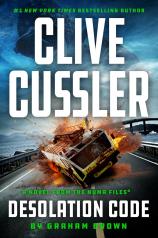Interview: November 14, 2024
Kurt Austin and the NUMA crew face swarms of deadly bio-hacked sea locusts, a runaway AI system and a sinister cult in the newly released CLIVE CUSSLER DESOLATION CODE. In this interview conducted by Michael Barson, Senior Publicity Executive at Melville House and Clive Cussler’s primary publicist at G.P. Putnam’s Sons from 1999 to 2015, Graham Brown talks about collaborating with Cussler on this series, the changes he has made to Kurt as a character, and the impact that technological innovations have on these books.
Question: DESOLATION CODE is your 13th entry in the NUMA (National Underwater and Marine Agency) Files adventure series, making you the leader in consecutive Cussler series entries behind only Clive himself. Were you aware that you hold that distinction?
Graham Brown: It’s one of those things that I’m only dimly aware of. It certainly doesn’t feel like I’ve done 13 books. Without tallying them up, I’d have probably guessed nine, maybe 10. Then again, I worked with Clive for 10 years, and they went by in a blink. We had a lot fun, but it goes too fast.
Q: When you first took over the NUMA Files series with DEVIL’S GATE, Clive was still active in writing the original Dirk Pitt books with his son, Dirk. What kind of interaction did you have with Clive while collaborating with him on this series?
GB: Clive was very good at getting the best out of people. One way he did that was to use a light touch. We would work together on the plots, the storyline and the characters, often in person because we both lived in Arizona. Clive would listen far more than he spoke. Then he’d offer a suggestion that usually would unlock the whole plot. But he never threw his weight around or expressed disappointment. He never made you feel like you were working for him; you felt more like longtime collaborators of equal stature. I can’t speak for the other coauthors, but I’ve always thought that made it possible for us to be at our most creative.
Q: The world was a much different place when you began work on the NUMA Files series. What have some of the changes been in your approach to the stories you’ve authored over the course of 13 adventures? And have there been any changes to Kurt Austin as a character?
GB: The world has definitely changed, but I’ve never tried to be topical or follow some current events trend, so a lot of that change is sort of background at best. I think you could pick up most of my books, and they all could fit into the aughts, the teens or the ’20s.
As for Kurt, I’ve tried to make him a little edgier. I’ve wanted to build in a past that makes him willing to risk life and limb for his friends and his country. You can see it more in some books than others. I’d say the best example is in GHOST SHIP, where he’s confronting a past that he’s not sure is real. And some in NUMA think he’s cracking up, while others --- including, of course, Joe Zavala but also Dirk Pitt --- defend him and believe in him through and through.
Q: There is an ecological story element involving the ocean woven into each NUMA novel. That must require some very specialized research on your part. Is this an area in which you had expertise prior to joining the Cussler team?
GB: Not formally. But I’ve always been interested in the state of our world. Sometimes it’s a little depressing, but usually you find as many people fighting to fix things as those who are callously ruining it.
I’ve talked to some oceanographers and other scientific professionals over the years. But the only feedback you usually receive afterwards are emails from random “experts” telling you everything you’ve done wrong!
Q: Has the global warming crisis already been dealt with in the NUMA Files series? And do you foresee the looming effects of this frightening state of affairs changing the landscape --- or oceanscape more properly --- of Kurt Austin’s adventures in a fundamental way going forward?
GB: I’m sure it’s been touched on in a number of novels. It’s also one of those things that’s become too politicized to have a normal conversation. And by normal, I mean both sides listening to each other. They don’t have to agree. Let’s just try listening instead of shouting at each other.
As for the future, we shall see. If the science proves correct and we don’t take drastic world-altering action to cool the planet, then we’re going to see massive changes to the world’s oceans. I think that would have to be reflected in the world of NUMA. Storms are already bigger, worse and more frequent. Ice caps and glaciers are melting rapidly. If Kurt Austin is still patrolling the seas as these things continue to happen, it definitely will be reflected in the stories.
Q: So how do all the dramatic changes in technology in the real world affect the NUMA Files books?
GB: To begin with, we’re usually ahead of the game on tech, including items and processes that are cutting-edge experimental or even theoretical. That helps.
But other things make the writing more difficult. One of the great joys of adventure writing is to put your character in a place so remote that he or she is on their own beyond help --- beyond even calling for help. But with satellite phones and internet communications, it gets harder and harder to get our heroes truly lost.
On the other hand, technology can help us propel the story. New techniques can spot cities hidden in the jungle based on the type of foliage that has grown over it. At sea and in the air, drones are now everywhere. Our heroes can use these things to get answers fast, and the stories will keep moving at a rapid, page-turning clip.




